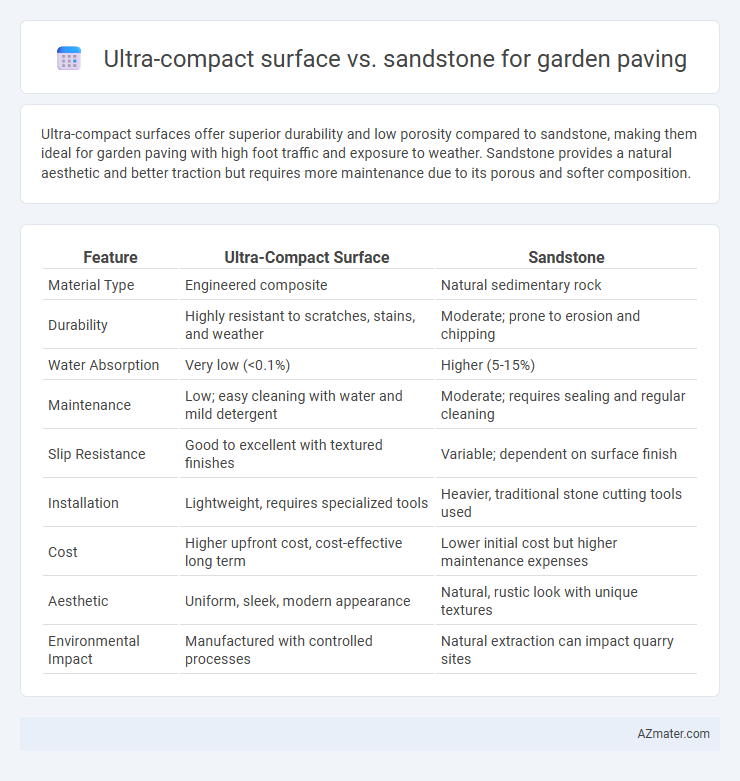Ultra-compact surfaces offer superior durability and low porosity compared to sandstone, making them ideal for garden paving with high foot traffic and exposure to weather. Sandstone provides a natural aesthetic and better traction but requires more maintenance due to its porous and softer composition.
Table of Comparison
| Feature | Ultra-Compact Surface | Sandstone |
|---|---|---|
| Material Type | Engineered composite | Natural sedimentary rock |
| Durability | Highly resistant to scratches, stains, and weather | Moderate; prone to erosion and chipping |
| Water Absorption | Very low (<0.1%) | Higher (5-15%) |
| Maintenance | Low; easy cleaning with water and mild detergent | Moderate; requires sealing and regular cleaning |
| Slip Resistance | Good to excellent with textured finishes | Variable; dependent on surface finish |
| Installation | Lightweight, requires specialized tools | Heavier, traditional stone cutting tools used |
| Cost | Higher upfront cost, cost-effective long term | Lower initial cost but higher maintenance expenses |
| Aesthetic | Uniform, sleek, modern appearance | Natural, rustic look with unique textures |
| Environmental Impact | Manufactured with controlled processes | Natural extraction can impact quarry sites |
Introduction: Choosing the Right Garden Paving Material
Ultra-compact surface paving offers exceptional durability and low maintenance, making it ideal for high-traffic garden areas. Sandstone provides a natural, textured look with excellent slip resistance, enhancing aesthetic appeal and safety in outdoor spaces. Selecting between these materials depends on balancing long-term performance with the desired garden style and ambiance.
Ultra-Compact Surface Overview
Ultra-compact surfaces offer exceptional durability and low porosity, making them highly resistant to stains, scratches, and weathering, ideal for garden paving applications. Their non-porous structure prevents weed growth and simplifies maintenance compared to traditional materials like sandstone, which can be more porous and prone to erosion. Ultra-compact surfaces are available in a wide range of colors and finishes, providing versatile aesthetic options while ensuring long-lasting performance in outdoor environments.
Sandstone Paving Overview
Sandstone paving offers natural durability and unique texture, making it a popular choice for garden paths and patios due to its slip resistance and weather resilience. Ultra-compact surfaces provide a sleek, low-maintenance alternative with higher density and stain resistance but lack the organic aesthetic that sandstone delivers. Garden designs benefit from sandstone's earthy tones and variation, enhancing outdoor spaces with authentic, natural stone appeal.
Durability: Ultra-Compact Surface vs Sandstone
Ultra-compact surface materials offer superior durability compared to sandstone, as they resist scratches, stains, and weathering more effectively. Sandstone is prone to erosion, chipping, and discoloration over time due to its porous nature, making it less suitable for high-traffic garden paving areas. The high density and non-porous structure of ultra-compact surfaces ensure long-lasting performance and minimal maintenance in outdoor environments.
Maintenance and Cleaning Requirements
Ultra-compact surfaces for garden paving offer superior resistance to stains, dirt, and moss compared to sandstone, making maintenance and cleaning much easier and less frequent. Sandstone, being porous and softer, tends to absorb moisture and harbor algae, requiring regular sealing and pressure washing to maintain its appearance. The low porosity and durability of ultra-compact materials reduce the need for harsh chemicals and extensive upkeep in outdoor garden environments.
Aesthetic Appeal and Design Options
Ultra-compact surfaces offer a sleek, modern aesthetic with a smooth finish that enhances contemporary garden designs, while sandstone provides natural tones and textures that blend seamlessly with rustic or traditional settings. Ultra-compact paving allows for precise, geometric patterns and large slab formats, creating a minimalist and uniform look. Sandstone's varied color palette and organic grain make it ideal for creative layouts that emphasize natural beauty and earthy charm.
Slip Resistance and Safety
Ultra-compact surfaces provide superior slip resistance due to their non-porous, dense composition, making them ideal for garden paving in wet or high-traffic areas. Sandstone, while aesthetically pleasing with its natural texture, can become slippery when wet and may require additional treatments to enhance safety. Prioritizing ultra-compact materials ensures a safer, more durable garden paving solution that minimizes slip-related accidents.
Weather Resistance and Longevity
Ultra-compact surfaces exhibit superior weather resistance compared to sandstone, with enhanced durability against frost, UV rays, and heavy rain, making them ideal for diverse climates. Sandstone, while aesthetically pleasing, tends to absorb moisture and may suffer from erosion and cracking over time, reducing its lifespan in harsh weather conditions. The long-term longevity of ultra-compact surfaces typically surpasses sandstone, maintaining structural integrity and appearance with minimal maintenance.
Environmental Impact and Sustainability
Ultra-compact surfaces offer superior durability and reduced water absorption compared to sandstone, minimizing maintenance and extending lifespan in garden paving applications. Sandstone, a natural material, provides excellent permeability that supports groundwater recharge, but extraction can cause habitat disruption and higher carbon emissions. Choosing ultra-compact paving with recycled content and low embodied energy can significantly lower environmental impact while maintaining sustainable garden design.
Cost Comparison and Value for Money
Ultra-compact surfaces typically cost between $50 to $100 per square meter, offering high durability and low maintenance, making them a cost-effective long-term investment for garden paving. Sandstone, priced around $30 to $70 per square meter, provides natural aesthetic appeal but requires more frequent sealing and upkeep, increasing lifetime expenses. Evaluating both materials, ultra-compact surfaces deliver superior value for money due to their longevity and resistance to weathering compared to sandstone's moderate initial cost but higher maintenance demands.

Infographic: Ultra-compact surface vs Sandstone for Garden paving
 azmater.com
azmater.com